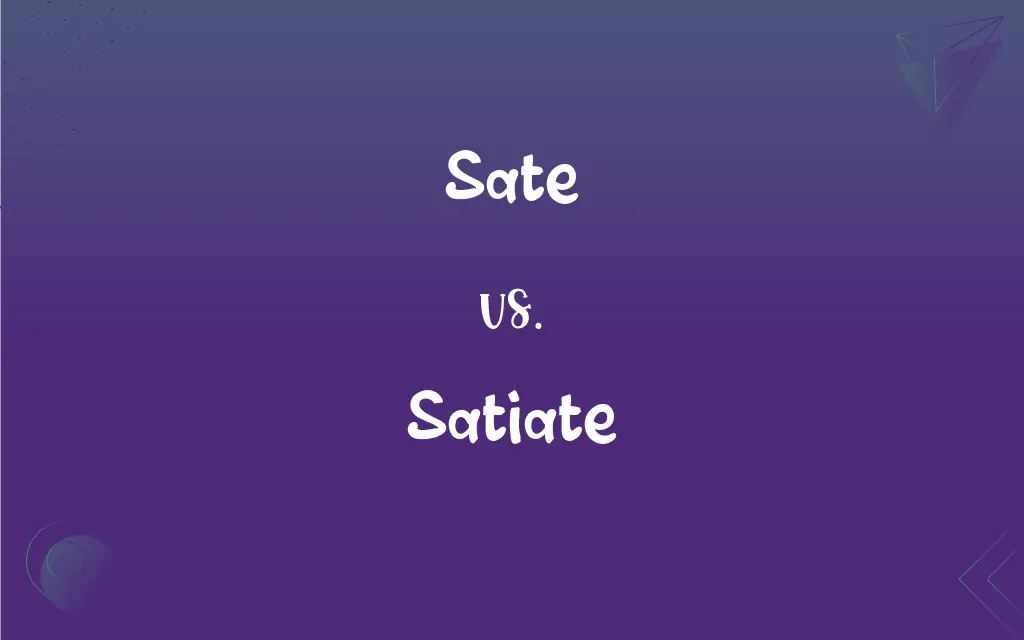Sate vs. Satiate: What's the Difference?
By Aimie Carlson & Harlon Moss || Updated on May 28, 2024
Sate means to fully satisfy a desire or appetite, often implying excess. Satiate also means to fully satisfy but emphasizes the point of reaching an extreme or beyond what is needed.

Key Differences
Sate means to completely satisfy a desire or appetite, often implying that the satisfaction is to the point of excess. Satiate, on the other hand, also means to satisfy fully but typically emphasizes reaching an extreme or even going beyond what is necessary.
Both terms can be used interchangeably in some contexts, but satiate often implies a more intense or extreme level of satisfaction compared to sate. While you might sate a simple craving with a small amount of something, to satiate it suggests a more complete and sometimes overwhelming fulfillment.
In literature and speech, sate is often used in a more straightforward manner, whereas satiate carries a slightly more formal or literary tone. Both terms derive from the Latin word "satiare," meaning to fill or satisfy.
Sate tends to be used more commonly in everyday language, while satiate is often found in more formal contexts or descriptive writing. Despite their similarities, choosing between the two can subtly change the nuance of the sentence.
Comparison Chart
Meaning
Fully satisfy
Fully satisfy to an extreme level
ADVERTISEMENT
Connotation
Often implies excess
Emphasizes beyond what is needed
Usage
More common in everyday language
More formal or literary
Intensity
Thorough fulfillment
Complete and often overwhelming
Origin
Latin "satiare"
Latin "satiare"
Sate and Satiate Definitions
Sate
To fully satisfy a desire or appetite.
She sated her hunger with a large dinner.
ADVERTISEMENT
Satiate
To satisfy to an extreme level.
The meal was so large it satiated even the biggest appetites.
Sate
To provide enough to satisfy.
The program sated the students' curiosity about science.
Satiate
To indulge to excess.
He satiated his curiosity by exploring every detail of the case.
Sate
To fulfill thoroughly.
The novel sated his desire for adventure.
Satiate
To quench completely.
The long walk satiated her need for exercise.
Sate
To satisfy (an appetite) fully.
Satiate
To satisfy (an appetite, for example) fully.
Sate
To provide (someone) with more than enough; glut.
Satiate
To provide (someone) with more than enough; glut.
Sate
A past tense of sit.
Satiate
Filled to satisfaction.
Sate
To satisfy the appetite or desire of; to fill up.
At last he stopped, his hunger and thirst sated.
Satiate
(transitive) To fill to satisfaction; to satisfy.
Nothing seemed to satiate her desire for knowledge.
Sate
Satay
Satiate
(transitive) To satisfy to excess. To fill to satiety.
Sate
To satisfy the desire or appetite of; to satiate; to glut; to surfeit.
Crowds of wanderers sated with the business and pleasure of great cities.
Satiate
Filled to satisfaction or to excess.
Sate
Fill to satisfaction;
I am sated
Satiate
Filled to satiety; glutted; sated; - followed by with or of.
Sate
To fill to the brim or full extent.
The feast was enough to sate everyone.
Satiate
To satisfy the appetite or desire of; to feed to the full; to furnish enjoyment to, to the extent of desire; to sate; as, to satiate appetite or sense.
These [smells] rather woo the sense than satiate it.
I may yet survive the malice of my enemies, although they should be satiated with my blood.
Sate
To meet the requirements or desires completely.
The documentary sated her interest in history.
Satiate
To full beyond natural desire; to gratify to repletion or loathing; to surfeit; to glut.
Satiate
To saturate.
Content with science in the vale of peace.
His whole felicity is endless strife;No peace, no satisfaction, crowns his life.
He may be satiated, but not satisfied.
Satiate
Fill to satisfaction;
I am sated
Satiate
Overeat or eat immodestly; make a pig of oneself;
She stuffed herself at the dinner
The kids binged on icecream
Satiate
Supplied (especially fed) to satisfaction
Satiate
To fill beyond capacity.
The story was detailed enough to satiate any reader.
Satiate
To gratify fully.
The performance satiated the audience's desire for entertainment.
FAQs
Which term is more common in everyday language?
Sate is more commonly used in everyday language.
What does "sate" mean?
Sate means to fully satisfy a desire or appetite, often to the point of excess.
Is "satiate" more formal than "sate"?
Yes, satiate tends to be used in more formal or literary contexts.
What is an example of using "satiate" in a sentence?
E.g., The book's detailed explanations satiated his curiosity about the subject.
Can "sate" and "satiate" be used interchangeably?
Yes, in many contexts they can be used interchangeably, but satiate often implies a higher intensity.
Can "satiate" be used in casual conversation?
Yes, but it is less common and might sound more formal.
What is an example of using "sate" in a sentence?
E.g., She sated her sweet tooth with a chocolate bar.
Are there any synonyms for "sate"?
Yes, synonyms include satisfy, fulfill, and quench.
How is "satiate" different from "sate"?
Satiate implies satisfying to an extreme level or beyond what is necessary, whereas sate means to thoroughly fulfill.
Are there any synonyms for "satiate"?
Yes, synonyms include gratify, indulge, and glut.
What is the origin of "sate"?
Both sate and satiate derive from the Latin word "satiare."
Does "satiate" imply a more intense satisfaction than "sate"?
Yes, satiate suggests a more complete and sometimes overwhelming fulfillment.
Can "sate" be used in a formal context?
Yes, but it is more commonly used informally.
What part of speech are "sate" and "satiate"?
Both are verbs.
Do "sate" and "satiate" have the same Latin root?
Yes, both come from the Latin "satiare."
Does "sate" have a negative connotation?
Not necessarily, but it can imply overindulgence.
Is there a noun form of "satiate"?
Yes, "satiation" is the related noun form.
Which term would be more appropriate in academic writing?
Satiate would likely be more appropriate in academic writing.
Is there a noun form of "sate"?
Yes, "satisfaction" can be considered a related noun form.
What is a simple way to remember the difference between "sate" and "satiate"?
Remember that "satiate" suggests going beyond simple satisfaction to an extreme level.
About Author
Written by
Aimie CarlsonAimie Carlson, holding a master's degree in English literature, is a fervent English language enthusiast. She lends her writing talents to Difference Wiki, a prominent website that specializes in comparisons, offering readers insightful analyses that both captivate and inform.
Co-written by
Harlon MossHarlon is a seasoned quality moderator and accomplished content writer for Difference Wiki. An alumnus of the prestigious University of California, he earned his degree in Computer Science. Leveraging his academic background, Harlon brings a meticulous and informed perspective to his work, ensuring content accuracy and excellence.































































